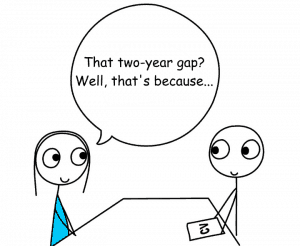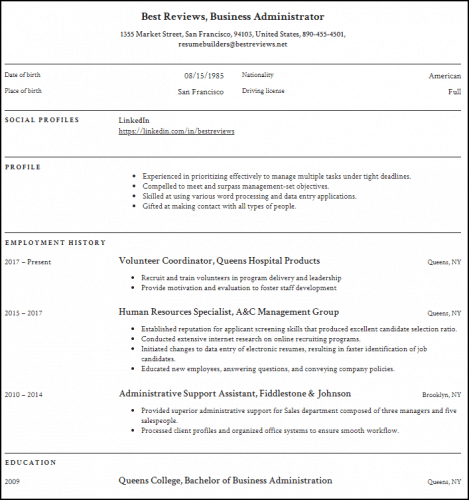Best Reviews> Resume Builders Reviews> Articles> Explaining Career Gaps in CVs the Professional Way
Best Reviews may receive compensation for its content through paid collaborations and/or affiliate links. Learn more about how we sustain our work and review products.

Many individuals still hold the belief that any employment gap is detrimental to their chances of getting hired, even though very few of us have a flawless career path. It can be challenging to explain such gaps during job interviews or on resumes, which often leads job seekers to worry about the potential negative impact. However, it is crucial to recognize that these career gaps may not necessarily lead to immediate rejection of the application. To increase your chances of landing the desired job, maintaining a professional and honest approach is key.
Above all, honesty is essential when presenting a resume with career gaps. While it may feel unsettling, attempting to hide or omit these gaps by altering job dates or leaving them out entirely is unprofessional and irresponsible, akin to exaggerating one’s skills. It is always best to be candid about these gaps, whether in your resume or while directly communicating with hiring managers. Employers typically understand that job gaps can occur and are more accepting if they are clearly explained without any attempts to conceal them. In fact, in the age of skepticism, being truthful and forthcoming is one of the most effective ways to earn the respect of potential employers.

“# 8230, & I Can Explain ,”
Effectively explaining the reasons behind any gaps in your employment history is crucial, as honesty alone may not suffice. While it’s not necessary to provide a detailed explanation for every gap, certain specific reasons, like unexpected illness, childcare responsibilities, or burnout, can be summarized in a single sentence during the interview. However, it’s essential to be prepared to discuss with employers why you took deliberate breaks or experienced unfortunate layoffs.
Addressing the causes of job gaps should not be limited to the job interview; if you feel confident in your writing skills, consider including the explanation in your application or cover letter if there’s enough space. The objective is to provide important information in your CV that aids the application process.
Increasing Job Spaces Suitable
In some instances, it might be appropriate to omit certain time-offs, especially if they occurred in the distant past within an already well-established career. However, when unavoidable gaps need to be addressed, two strategies can be used to minimize their impact.
Utilizing a Unique Date Format
Utilizing a Unique Date Format: Use only the years to indicate the duration of previous employments, which can make employment gaps appear less significant without resorting to dishonesty. Instead of providing specific months and years for each job, you can simply state the start and end years of each position. However, it’s essential to note that this approach is most effective for short gaps, typically less than a year, and it may prompt questions about the exact duration of your previous employments during the interview process.
completing cracks
No matter the reason for a job gap, any productive activity undertaken during that period should be included on the CV as a replacement for additional work experience. Whether it involved taking classes, traveling, caring for children, or pursuing genuine passions, such information can be valuable to showcase. Even though it might appear challenging to incorporate this information into an already compact profile or cover letter, it is highly likely to come up during interviews. Demonstrating that any time away from work was utilized positively can be advantageous for both applicants and recruiters as it highlights personal or professional development during the gap period.
The Top Resume Builders of 2023
| Rank | Company | Info | Visit |
1 | My Perfect Resume |
| |
2 |  |
| |
3 |  |
|
